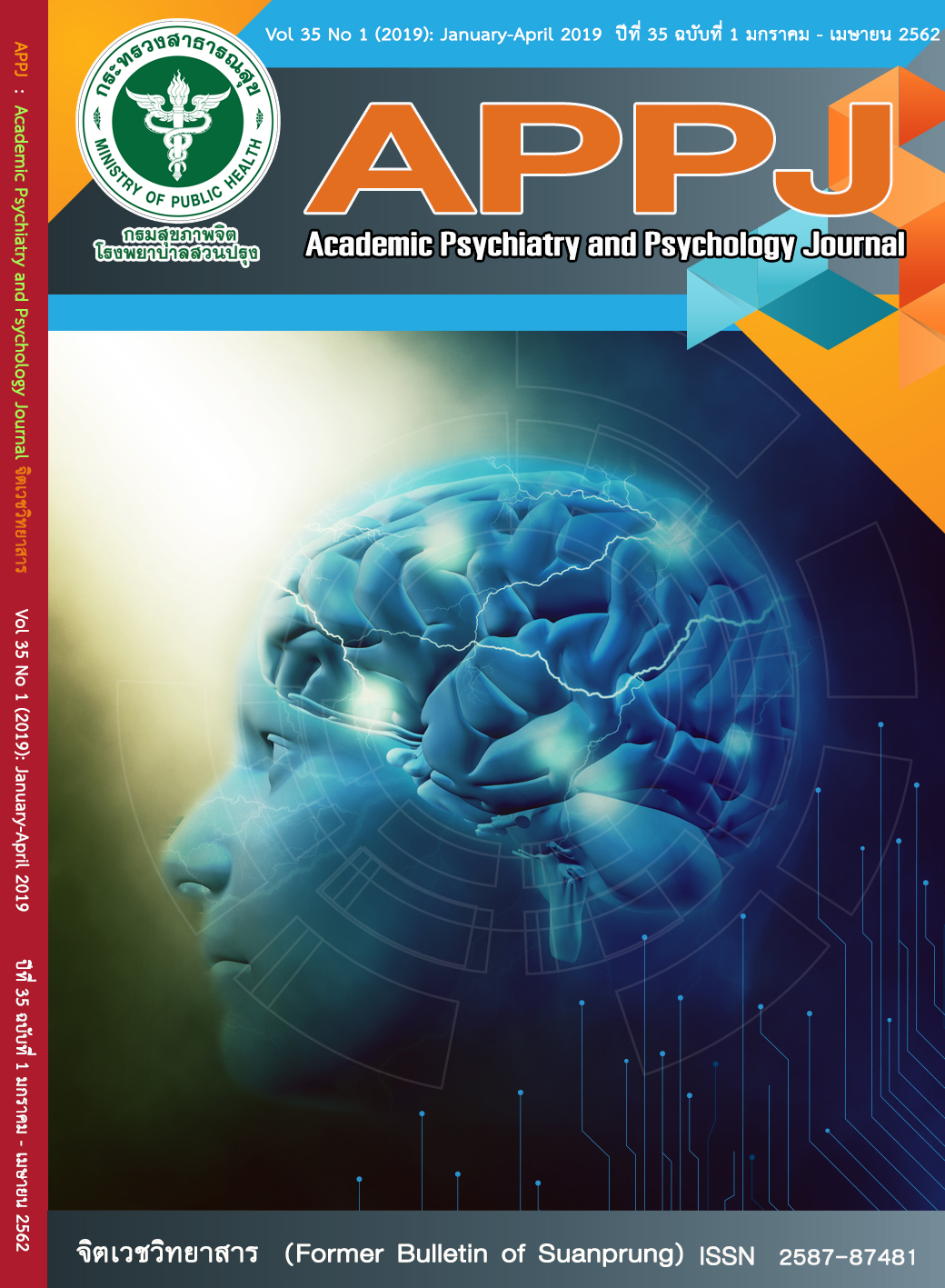Parental Acceptance of Children with Autistic Spectrum Disorder
Main Article Content
Abstract
Abstract
Objective: To understand the process of parental acceptance of children with Autism Spectrum Disorder (ASD) according to the 5 stages of grief and loss theory by Kubler Ross.
Method: we used a qualitative phenomenological research design. Data were collected through in-depth interviews .In-depth data were collected by purposive sampling method for five informants from Tak association of parents of autistic child from May 2016 to October 2017.
Result: The process of parental acceptance of a child with Autism includes the parent’s and the family’s denial about autism; a parent’s anger towards the inability to handle the child’s symptoms as well as towards the reaction of people surrounding the child; and guilty, negative thoughts about pregnancy and unsuitable parenting as being the cause of autism. Acceptance of autism leads to improvement in the child’s parenting and consequent treatment. A positive change in a parent’s attitude is the recognition that their child can make them see the good in bad.
Conclusion: The process of parental acceptance of children with Autism Spectrum Disorder (ASD) is, in general, in accordance with the 5 stages of grief and loss theory by Kubler Ross.
Keyword: Acceptance, Parent, Autism
Article Details
บทความหลังผ่านการปรับแก้จากกองบรรณาธิการแล้ว เป็นลิขสิทธ์ของวารสารจิตเวชวิทยาสาร โรงพยาบาลสวนปรุง กรมสุขภาพจิต กระทรวงสาธารณสุข ห้ามเผยแพร่เพื่อประโยชน์ทางการค้าโดยไม่ได้รับอนุญาต แต่อนุญาตให้เผยแพร่บทความดังกล่าวเพื่อประโยชน์ทางการศึกษาแก่ประชาชนทั่วไป ทั้งนี้กองบรรณาธิการไม่จำเป็นต้องเห็นด้วยกับบทความหรือข้อคิดเห็นใดๆ ที่ปรากฏในวารสารสวนปรุง
References
2. Ozonoff S, Young GS, Steinfeld MB, Hill MM, Cook I, Hutman T, et al. How early do parent concerns predict later autism diagnosis? J Dev Behav Pediatr. 2009;30(5):367-75.
3. ANDREICA-SĂNDICĂ B, Patca S, Panaete A, Andreica S. The impact of autism diagnosis on the family. Autism. 2011;2:2.
4. Piyasin W, Khetman P. Child and adolescent psychiatry. Bangkok: Beyond Enterprise Publishing; 2002.
5. Altiere MJ, von Kluge S. Searching for acceptance: Challenges encountered while raising a child with autism. J Intellect Dev Disabil. 2009;34(2):142-52.
6. Farrugia D. Exploring stigma: Medical knowledge and the stigmatisation of parents of children diagnosed with autism spectrum disorder. Sociol Health Illn. 2009;31(7):1011-27.
7. Kubler-Ross E. On death and dying: What the dying have to teach doctor, nurse, clergy and their own famillies. New York: Routledge; 1969.
8. Jones L, Hastings RP, Totsika V, Keane L, Rhule N. Child behavior problems and parental well-being in families of children with autism: The mediating role of mindfulness and acceptance. Am J Intellect Dev Disabil. 2014;119(2):171-85.
9. Podhisita C. The science and art of qualitative research. 3rded. Bangkok: Amarin Printing & Publishing; 2007. (in Thai)
10. Moses K. The impact of childhood disability. WAYS magazine. 1987:6-10.
11. Mary Beth Goring. The cycle of love and grief in parents of children with special Needs [online]. 2013 [cited 2017 Oct 31. Available from: https://www.pdffiller.com/jsfiller-desk1/projectId=155429529&expId=2990&expBranch=3#844411edbc3144649f9ddf0e7fb85c48
12. Matenge B. An exploration of lived experiences of mother raising children with autism: University of Cape Town; 2016.
13. Barnett D, Clements M, Kaplan-Estrin M, Fialka J. Building new dreams: Supporting parents' adaptation to their child with special needs. Infants & Young Children. 2003;16(3):184-200.
14. Boushey A. The grief cycle - one parent's trip around. Focus Autism Other Dev Disabl. 2001;16(1):27-30.
15. Photong P. Study of health status of autistic children, knowledge and stress levels of caregivers of children with autistic receving service at the Special Education Center (Region 5) Suphanburi Province. Journal of Phrapokklao Nursing College. 2014;2:26-40.
16. Dzubay SK. Parent grief, coping strategies, and challenges when a child has autism spectrum disorder. Family Studies and Human Development: University of Wisconsin-Stout; 2011.
17. Bozosi J. Applying grief theory to autism treatment. Behavior Analysis Quartery. 2016;2(1).
18. Amy M, Katherine M. Parents of children with mental illness: Exploring the caregiver experience and caregiver-focused interventions. Families in Society: The Journal of Contemporary Social Services. 2011;92(9):188-90.
19. Freese DA. Living through grief and growing with it. 1, editor. United States of America: Burnes&Noble books; 1977.

